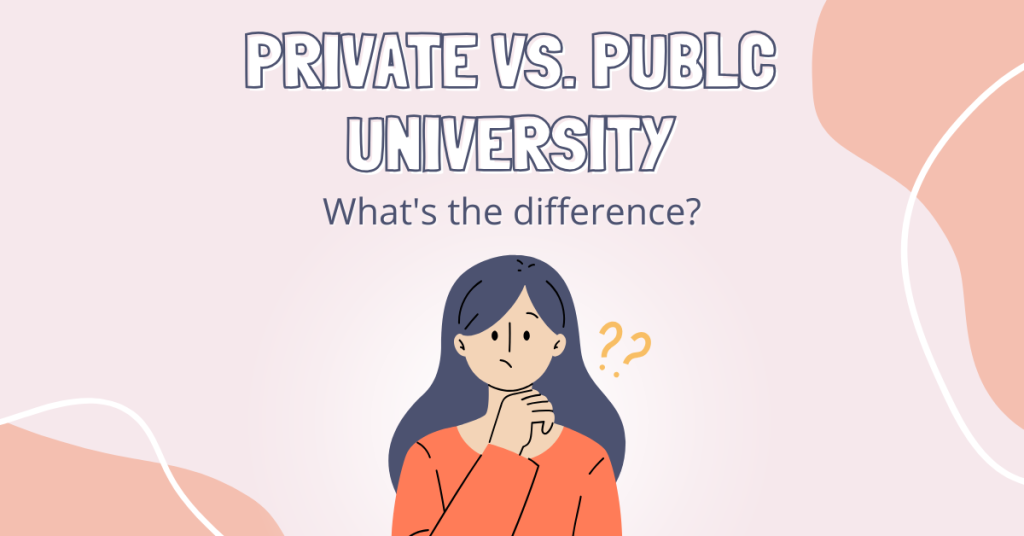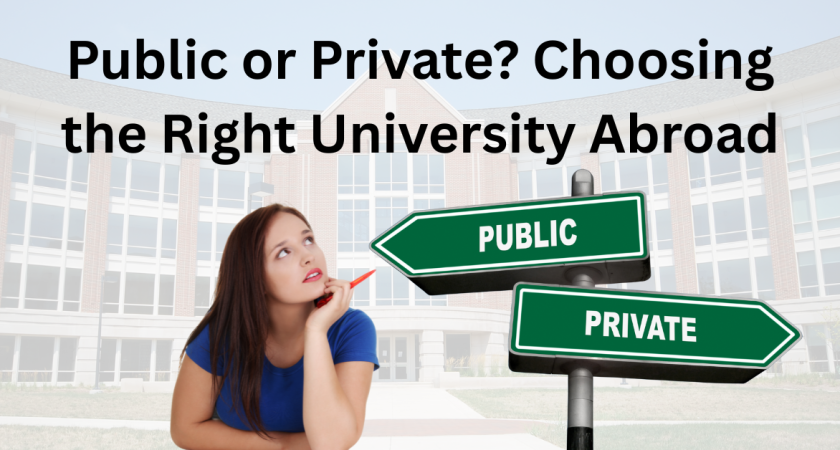The first thing we all consider when sitting down to make our college choice is always, do we
attend a private university or a public university. Planning to study abroad universities, the
same question pops up in our mind. International students also need to make one of the most
significant decisions: whether to pursue education at a public university or a private
university. Although both have great prospects, they are different in the context of education,
career opportunities, and economics. Therefore, knowing these differences is as essential as
preparing for your scholarship test, particularly when doing a university comparison and
finalizing your college choice in foreign higher education abroad.
Difference between public and private universities for students
Education
The foremost thing that needs to be understood is, public universities are supported by
governments, hence they are able to provide a big number of academic programs and
enormous research centers. These universities are renowned for their intense focus on
research and association with international institutions; but the issue which mostly arises is
regarding the student strength. Since public institutions offer a broad scope of academic
courses, they welcome a multiracial number of students; this restricts face-to-face contact with
instructors. This reflects the pros and cons of studying in a private university versus a larger
public one.
Private universities, by contrast, depend much more on tuition payments and endowments.
Therefore, the strength does not equate to the diversification of the public institution. The
negative consequence of this can be observed in terms of smaller class size and a more
individualized learning environment. The students get more personal interaction with teachers,
specialized programs in areas like business or law, and more access to student services and
career counseling.
Most of the world-famous study abroad universities, e.g., the University of Toronto or the
University of California, Berkeley, are public universities renowned for their academic quality
and innovation. Well-known institutions like Harvard, Stanford, or MIT are private universities
that possess a high degree of international recognition and prestige. For those curious about
public vs private colleges: which is better for higher studies, both types have internationally
acclaimed examples that make the college choice more challenging.

Public vs private colleges: which is better for higher studies
Career Opportunities
Now let’s come to that question which is said to be one of the most crucial ones: which provides
better career opportunities? When it comes to their students’ career, public universities
typically have close relationships with state industries and regional employers, which can be a
resource for internships and research opportunities. Their alumni bases are large but frequently
localized in the country or region. This is among the advantages of studying in a public
university abroad, particularly for those who plan to work within the same region after
graduation.
While, private universities often provide greater global recognition and are well-reputed for
their selective alumni networks that lead to top-notch global careers. They also offer extensive
post-study career services in place, catering specifically to the needs of international students,
making it easier to transition into post-study work. When comparing public vs private universities
for international students, private ones are often highlighted for their global networking. This is
why students rely heavily on university comparison reports before making their college
choice.
Cost comparison between public and private universities
Finance
Another highly variable factor is finance. Money matters tend to be a determining factor among
overseas students. Public universities usually have lower fees for local students, but overseas
students usually have to pay more, sometimes getting close to the private ones. Yet they do
provide research or teaching assistantships, particularly at the graduate level, that assist in
minimizing expenses. As public universities tend to be situated within smaller towns or
suburbs, living costs are lower. This is why the cost comparison between public and private
universities often indicates that public universities can be budget-friendly for a student.
Private universities, on the other hand, levy much more expensive tuition fees. The simplest
way to fight this issue is by obtaining a scholarship, since they are also famous for giving
bountiful scholarships and financial assistance packages. Private universities are mostly
located in big cities such as New York, Boston, or London, where living costs are considerably
higher. But it has its perks too, as being in urban areas also offers more access to internships,
networking, and work chances. Most students weighing the best universities for students in
the cities consider that the added expense is offset by greater opportunity.
How to choose between public and private universities
Last Impression
Ultimately, how to choose between public and private universities as a student comes down towhat you care about most. Public colleges and universities tend to be a better fit if you are
looking for more affordable tuition, good research facilities, and the old campus experience.
Private colleges and universities are best for you if you enjoy the more frequently discussed
elite college lifestyles, personalized attention, worldwide networking, and a more customized
experience.
Both, public universities and private universities are an important key to your
accomplishment, if selected and guided correctly. The solution is balancing finances, academic
aspirations, and future career prospects in foreign higher education abroad with personal
ambitions. Most students make their college choice after conducting a university comparison
and weighing finances, academic ambitions, and future professional futures in foreign higher
education abroad against personal aspirations.
Written by Swastika Chakraborty.
